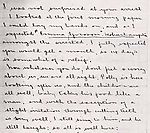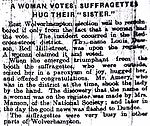 Emma Sproson
Emma Sproson Extract from a letter from husband Frank to Emma in prison 1907
Extract from a letter from husband Frank to Emma in prison 1907 Pankhurst election campaign, Smethwick, 1918
Pankhurst election campaign, Smethwick, 1918 Suffrage meeting disrupted
Suffrage meeting disrupted An error on the voters' register allows a woman votes in 1908
An error on the voters' register allows a woman votes in 1908

In 1902 the Birmingham and Midlands branch of the National Union of Women’s Suffrage Societies (NUWSS) was formed. Local branches soon sprang up in the Black Country; Stourbridge in 1903, Wolverhampton in 1904, West Bromwich in 1911, Walsall and Wednesbury in 1912 and Dudley in 1913.
The Women’s Social and Political Union (WSPU) also had local branches. Between 1906 and 1911 branches were set up in Wolverhampton, Stourbridge, Smethwick, Warley, Walsall and Kingswinford.
Wolverhampton’s Emma Sproson was an active campaigner and attended the first Women’s Parliament in February 1907. She was arrested, along with 50 other women, and chose to serve 14 days in prison rather than pay a fine. A letter from Frank to Emma whilst in prison is included here.
In the 1908 Spring by-elections in Wolverhampton East, local suffragists campaigned against the Liberal candidate, GR Thorne. Since for years the Liberal Government had failed to further the cause of votes for women, they believed that a change of government would bring about a change of attitude. National leaders of the suffrage movement descended on the constituency to address meetings in support of the Conservative candidate, but without success. He was defeated by just eight votes.
There was a minor victory for the suffragettes in May of that year. An error on the voting register led to a Lois Dawson being issued with a polling card under the man's name of Louis. She and her colleagues were jubilant when she was able to attend the polling station and cast her vote.
Other local branches saw their share of the action. In September 1909, as he left a meeting in Birmingham, Prime Minister Asquith was pelted with tiles by suffragettes, who had managed to climb onto the roof of the building. They were arrested, imprisoned and subsequently force-fed after going on hunger strike.
In April 1912, there was outrage when the Dudley Castle canon was fired in the middle of the night. It was found that 'Votes for Women' had been painted on it. An investigation concluded that women would be unable to clean, prepare and fire a canon, and blamed male sympathisers.
An arson campaign began in Birmingham in 1913. Rowley Church and houses in Olton, Selly Park and Four Oaks were set on fire.
Although women's suffrage was the main focus of the various groups and branches, many other issues affecting women were considered, including sweated labour, factory and workshop legislation, tax issues, white slave traffic, and the state's role in respect of children.
The war years saw a reduction in activity nationally. In 1918, at the end of the war, women aged 30 and over were granted the vote, and were allowed to stand as parliamentary candidates for the very first time. Christabel Pankhurst stood in Smethwick as an Independent Patriotic candidate against Major SN Thompson, Coalition Party, and Mr John E Davison, Labour Party. No-one had anticipated that she would stand in Smethwick, but the Women's Party recognised that Smethwick offered the best opportunity for success. Smethwick was a new constituency and as it had no sitting member, no-one had an advantage. Nevertheless, she was defeated by the Labour candidate, who had a majority of only 775.
Rollover the captions in the box to see the available images in thumbnail format, click the caption to see the full-size image
| Reference: | 735 |
| Keywords: | |
| Archive Ref: | |
| Updated: | Thu 26 Jun 2008 - 1 |
| Interpretation written by | Jenny Ermoyenous |
| Author's organisation | Curatorial |
| Organisation's website | |
| needs to be checked | images from Wolverhampton archive - Emma, letter, articles. |